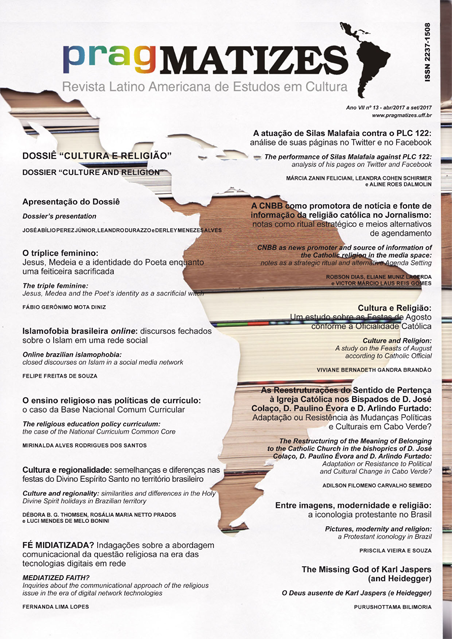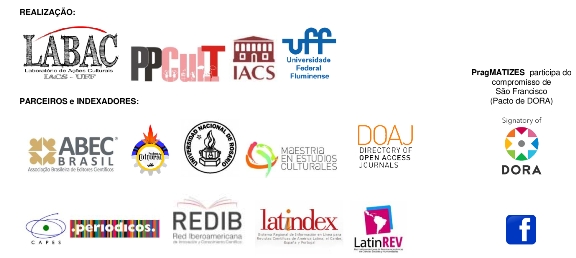The triple feminine: Jesus, Medea and the Poet’s identity as a sacrificial witch
DOI:
https://doi.org/10.22409/pragmatizes.v0i13.10457Abstract
Built from a comparison between the figures of the Greek mythical character Medea and the savior and son of God, from Christian mythology, Jesus Christ, the text intends to present a possible sight of the Poet’s image we named “sacrificial witch.” The idea is to propose a symbolic referential tópos from which the artist, especially the Poet, will be understood as a female figure and endowed with special powers over the cosmos, whose sacrifice leads to an ascension. In this ascension are revealed a series of symbols and images linked to the universe of the woman as mother, foreigner and witch, who act as fundamental driver forces of her poetic work, derived from this crisis established in the identity of the creator in the face of her martyrdom. Thus, starting from our analysis of the two archetypal characters, we will propose a perception of the sacrificed sorceress as one of the possible identity archetypes of this Poet in the face of suffering.Downloads
References
ANDRADE, C. D. de. Alguma poesia. São Paulo: Companhia das Letras, 2013. BARBOSA, Tereza Virgínia Ribeiro. Uma mulher vestida de sol: Medeia e a virgem-mãe Maria. In: Arquivo Maaravi: Revista Digital de Estudos Judaicos da UFMG. Belo Horizonte, v. 7, n. 12, mar. 2013, pp. 170-179. Disponível em: http://www.periodicos.letras.ufmg.br/index.php/maaravi/article/viewFile/4686/4396. Último acesso: 11 de julho de 2017.
Biblia Hebraica Stuttgartensia. K. Elliger, W. Rudolph (ed.), Stuttgart: Deutsche Bibelgesellschaft, 1997. Disponível em: http://www.academic-bible.com/en/online-bibles/biblia-hebraica-stuttgartensia-bhs/read-the-bible-text. Último Acesso: 29 de julho de 2017.
BYNUM, Caroline Walke. “Jesus as Mother and Abbot as Mother: Some Themes in Twelfth-Century Cistercian Writing”. In: The Harvard Theological Review, Vol. 70, No. 3/4. Cambridge University Press on behalf of the Harvard Divinity School, Jul. – Out., 1977, pp. 257-284. Disponível: http://www.jstor.org/stable/1509631. Último acesso: 11 de julho de 2017.
DANTAS, Carolina. “Representei a dor que sentimos”, diz transexual ‘crucificada’ na Parada Gay”. In: G1. São Paulo, Junho de 2015. Disponível em: http://g1.globo.com/sao-paulo/noticia/2015/06/representei-dor-que-sentimos-diz-transexual-crucificada-na-parada-gay.html. Último acesso: 11 de julho de 2017.
DECLERCQ, Marie.
“Jesus Cristo foi o primeiro trans”, diz a 1ª pastora transgênera da América Latina”. In: Vice Brasil. São Paulo, Junho de 2017. Disponível em: https://www.vice.com/pt_br/article/8xa943/jesus-cristo-foi-o-primeiro-trans-diz-a-1a-pastora-transgenera-da-america-latina. Último acesso: 11 de julho de 2017.
AUTOR. “A Catábase de Orfeu e a queda de Lúcifer: a identidade do Poeta como um herói caído”. In: Revista Texto Poético. Vol. 18 (1o sem-2015), pp. 209-236. Disponível em: http://revistatextopoetico.com.br/index.php/rtp/article/view/410/323. Último acesso em 11 de julho de 2017.
______. A religião, a magia e o canto de Orfeu na Argonáutica de Apolônio de Rodes. Araraquara: Tese de Doutorado/Programa de PósGraduação em Estudos Literários da FCLAr, 2014. Disponível em: http://portal.fclar.unesp.br/posestlit/teses/Fabio_Geronimo_Mota_Di
niz_DO.pdf. Último acesso em: 10 jan. 2015.
EURÍPEDES. Medeia. Edição bilíngue. Tradução e notas de Trajano Vieira. São Paulo: Ed. 34, 2010.
JEROME St. Vulgate Bible. Ed. Bible Foundation and On-Line Book Initiative. Disponível em: http://www.perseus.tufts.edu/hopper/text?doc=urn:cts:greekLit:tlg0527.tlg001.perseuslat1:1.1. Último acesso em 12 de junho de 2015.
KELLY, H, A. Satã: uma Biografia. Tradução de Renato Rezende. São Paulo: Globo, 2008.
MARQUETTI, Flávia Regina. Da sedução e outros perigos: o mito da Deusa Mãe. São Paulo: Editora Unesp, 2013.
OLIVEIRA, F. R. Introdução. In: EURÍPIDES. Medeia. Trad., introd. e notas: Flávio Ribeiro de Oliveira. São Paulo: Odysseus Editora, 2006. p. 13-25.
OSAKABE, Haquira. Fernando Pessoa: Resposta à Decadência. São Paulo: Iluminuras, 2913.
PESSOA. Poesias. Nota explicativa de João Gaspar Simões e Luiz de Montalvor. Lisboa: Ática, 1995.
SIMÕES, João Gaspar. Vida e obra de Fernando Pessoa - História duma Geração. Lisboa: Livraria Bertrand, 1950.
WESTCOTT, D.D., Brooke Foss; HORT, D.D, Fenton John Anthony (ed.). Testament in the original Greek. Nova York: Harper & Brothers, Franklin Square,1885. Disponível em: http://data.perseus.org/citations/urn:cts:greekLit:tlg0031.tlg001.perseus-grc1:27.46. Último acesso 29 de julho de 2017.
Downloads
Published
How to Cite
Issue
Section
License
By forwarding an original to PragMATIZES, the authors agree that the copyright related to it is transferred to the Publishing. Articles and other writings are made available in PDF format from their publication, and they can be downloaded to institutional repositories and personal pages, provided that with their proper bibliographic indication.



